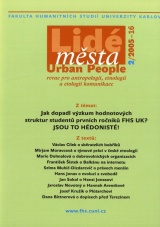Veřejný prostor a dobrovolnické organizace
DOI:
https://doi.org/10.14712/12128112.3897Abstrakt
In civic society we may encounter organizations created in pre-modern traditional era; organizations of characteristic origin, ethnicity or religion and entity. Basically, they represent institutionalization of friendly networks and “civicness“ associations that pervade ascriptive category. Different origin of these groups and associations contain different styles of relationships and behavior and lead to strengthening of differences within the value system. At the end of the millenium, a new topic arose, namely the “Global Association Revolution“. The framework of relationship in globalized world changes. Connection between social development processes in the South, North, East, and the West remains to be defined. Structural changes and development of social groups take place in Western democracies; civic society is created elsewhere. For example, it is re-established in Eastern and Central Europe as the “cause and effect” of large political changes following disintegration of socialist governments. Globalization brings about new perspective of world division into North and South countries in conjunction with permanent sustainability. Sustainability is not only an environmental concept. Governments are interested in peaceful co-existence of different cultures and value systems. This requires striking a balance in the world of mixing cultures and search for new cultural sources. It concerns creation of such social systems and strategies that may prevent, as some people caution, clash of civilizations, and on the other hand, contribute to creation of modern multicultural societies.
Stahování
Publikováno
Jak citovat
Číslo
Sekce
Licence

Tato práce je licencována pod Mezinárodní licencí Creative Commons Attribution-NonCommercial-NoDerivatives 4.0.


